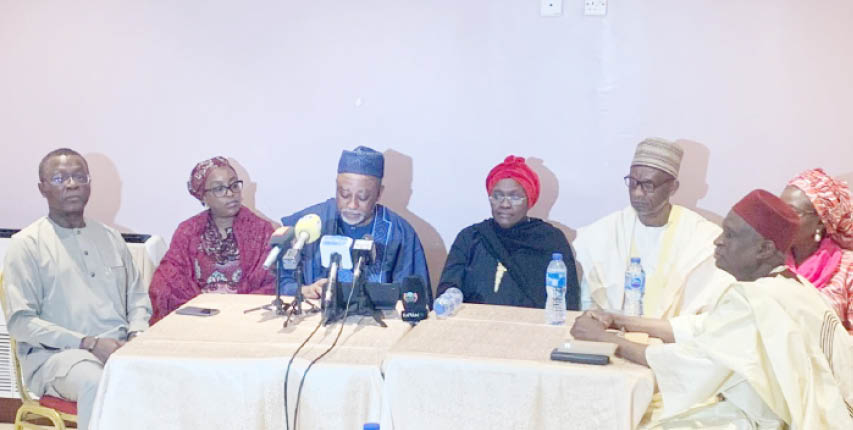Former members of Malam Nasir el-Rufai’s cabinet have disputed the Kaduna State House of Assembly’s report, accusing some of them and the former governor of misappropriating N423 billion.
In a press conference in Abuja, the ex-commissioners outlined financial details from El-Rufai’s eight-year tenure, asserting that the assembly’s report was politically motivated and aimed at tarnishing their administration’s achievements.
They said while El-Rufai had taken legal action to enforce his fundamental human rights and was currently barred from commenting on the matter, they had stepped forward to clarify what they termed a biased report intended to damage their reputation.
The commissioners who spoke included Jafaru Sani (environment and education), Hafsat Baba (human services and social development), Thomas Gyang (public works and infrastructure, planning and budget commission), Bashir Saidu (finance and chief of staff), Ibrahim Husaini (agriculture and environment), Aisha Dikko (justice), Fausat Ibikunle (housing and urban development), and Idris Nyam (business, innovation and technology, and sports development).
- 3yrs on, family of Kano POS operator arrested by DSS demands release, trial
- FCCPC raises alarm over adulterated foods, forceful ripening of fruits
Reading the address on their behalf, Sani stated, “El-Rufai was not invited by the ad hoc committee, which made certain claims against him.”
The ex-commissioners expressed pride in their service from May 2015 to May 2023 and described the assembly’s report as an unprofessional document, biased, and uninterested in establishing facts. They claimed the report was filled with inaccuracies, misrepresentations, and premeditated conclusions meant to inflict maximum reputational damage on selected members of El-Rufai’s administration.
They criticised the assembly’s approach, stating, “The report indulges in plucking outlandish figures out of thin air to create impressions of scandalous conduct. The legislators cite varying amounts for the same figures, showing the report’s incompetence.”
The commissioners pointed out that the assembly had previously accepted the state’s audited accounts for each year from 2015 to 2022 but now urged the public to disregard the former recognised accounts in favour of its “wishy-washy” report.
They presented figures from the audited accounts (May 2015–May 2023), stating: “Total receipts: N1,152,068,336,280.23; total expenditure: N1,320,016,507,917.2; budget deficit: N167,948,171,637; personnel cost: N361,615,641,995.04; overhead cost: N183,973,434,766.63; capital expenditure: N838,961,505,155.32; and public debt charges: N7,810,202,724.86,” which they said was contrary to the figures in the report, and begged the question of how N423,115,028,072.88 could have been siphoned within the same period as alleged by the report.
On the foreign loans secured by the El-Rufai administration, the former commissioners asked, “How can the Kaduna State House of Assembly claim that the loans were not properly utilised when the projects for which they were obtained are the only things the current administration can showcase?
“It is neither logical nor credible to disclaim and ridicule loan-taking while basking in the projects paid for by those same loans.”
They urged the current administration to transparently disclose any new disbursements from loans received post-May 2023, including the projects they funded and their completion status.
The former commissioners also defended the El-Rufai administration’s loans, stating they were within approved debt thresholds.
They questioned why the report was silent on the CBN’s Anchor Borrower Programme (ABP), where Kaduna State had significant borrowing. They alleged that the assembly ignored testimony from Ibrahim Husaini, former Commissioner for Agriculture, on the programme because it contained inconvenient facts.
Concluding their address, the commissioners highlighted the alleged unfairness and malice in the assembly’s report, questioning why certified true copies of the report had not been provided more than a month after its adoption. They affirmed their intention to fight the breach of their fundamental rights and defend their reputation against the report’s allegations.

 Join Daily Trust WhatsApp Community For Quick Access To News and Happenings Around You.
Join Daily Trust WhatsApp Community For Quick Access To News and Happenings Around You.


